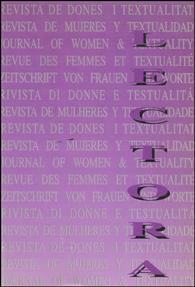Buenos libros, malas lectoras: la enfermedad moral de las mujeres en las novelas del siglo XIX
Abstract
El seu article parteix de l’afirmació que el destí de les dones al segle XIX està marcat, en la ficció, pel “bovarysme”, malaltia que proposa que les dones s’emmalalteixen i moren perquè llegeixen malament. El treball analitza aquest problema de la “mala lectura” traçant un recorregut que va des de Fernán Caballero fins a Freud i es comenten alguns episodis de lectura que apareixen en la “Autobiografía” de Gertrudis Gómez de Avellaneda, Clemencia, Amalia, Madame Bovary, María, La regenta i El caso Dora. Her article departs from the statement that the destiny of women in the 19th century is determined, in fiction, by “bovarysm”, an illness which proposes that women get sick and die because they read incorrectly. The work analyzes this problem of “bad reading” tracing a journey from Fernán Caballero to Freud, and comments on several episodes about the act of reading, from Gertrudis Gómez de Avellaneda’s “Autobiography”, Clemencia, Amalia, Madame Bovary, María, La Regenta and Dora’s Case.Downloads
Published
How to Cite
Issue
Section
License
The Author retains ownership of the copyright in this article and grants Lectora: revista de dones i textualitat the rights to print publication of the Article. The work will be available under a Creative Commons Attribution-Noncommercial-No Derivative Works license, by which the article must be credited to the Author and the Journal be credited as first place of publication.
The Author is free to enter in seperate, additional contractual agreements for the non-exclusive distribution of the work as published in this journal (such as institutional repositories or a book), as long as the original publication in Lectora is credited.
The Author is encouraged to post the work online (eg in institutional or thematic repositories, or in their website), as it can lead to productive exchanges as well as to a greater citation of the published work (see The Effect of Open Access).




